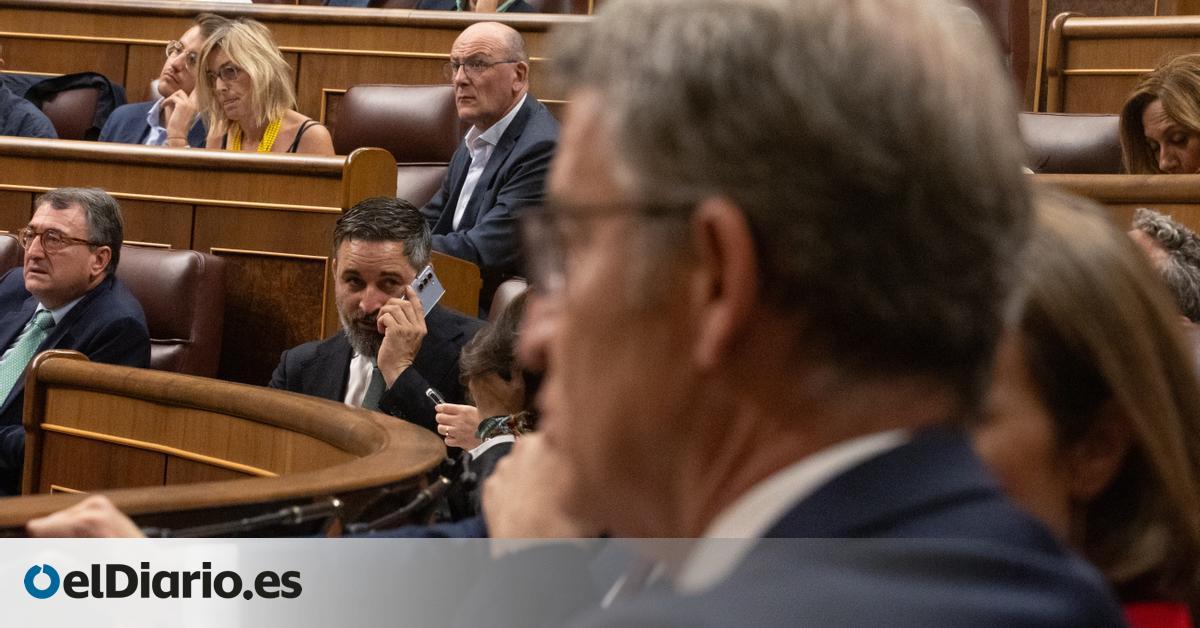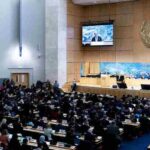
“He criticised Sánchez 50% and me 50%”, this is how the leader of the PP, Alberto Núñez Feijóo, summed up on Thursday the intervention of Santiago Abascal during Pedro Sánchez’s parliamentary appearance. The leader of Vox tried to provoke a hand-to-hand combat against his main ally, with whom he maintains dozens of municipal governments despite the rupture at the regional level. But Feijóo did not bite and, as in other previous provocations by the extreme right, he chose to focus on attacking the president of the Government.
Relations between the national leaderships of both parties have become even more strained following Vox’s exit from the regional governments. Abascal used as an excuse the reception of migrant minors similar to other agreements already agreed with the far right in power and forced his regional leaders to take a decision that none of them shared.
On Wednesday, Abascal tried to attack Feijóo’s ability to be an opposition party member. The leader of Vox accused his PP counterpart of dramatizing a tough parliamentary confrontation with Sánchez while agreeing to the unblocking and distribution of members of the General Council of the Judiciary. Or leaving them out of the negotiation to assign regional senators for Catalonia.
“They pretend to argue,” Abascal told Feijóo from the podium, using part of the time intended to respond to Sánchez, and then “they share the cards.” “It is neither ethical nor aesthetic,” he said, paraphrasing one of the phrases that the leader of the PP most often uses against Sánchez when talking about the alleged preferential treatment that his wife received from businessmen who later received public money.
In fact, Feijóo had used this expression minutes earlier: “It is neither ethical nor aesthetic that a good part of his party and government are under investigation. It is neither ethical nor aesthetic that letters of recommendation are signed in Moncloa to companies that receive money from his government.”
Abascal referred to pacts reached by the PP and PSOE in recent years, both with Feijóo and Pablo Casado at the helm. For example, the agreements to renew the Constitutional Court, the Court of Auditors or RTVE. In fact, the leader of the PP blames Sánchez for the “control” of these institutions despite the fact that many of the deputies of his group voted in favour in the last legislature.
The “clamp”, a reminder of the 90s
The leader of Vox thus raised a challenge not only to the Feijóo era, but also to the entire relationship of the PP with the Government of Pedro Sánchez since June 2018. “It is incomprehensible that they share the CGPJ, giving it a breath of fresh air; the Constitutional Court, and that they have appointed Conde-Pumpido; the Court of Auditors, RTVE, the Electoral Board [pendiente de renovación] and the parliamentary committees of Congress and the Senate, in addition to the seats in Brussels,” Abascal explained.
Abascal thus raised a scenario of a breakdown between his party and the PP. One more, because the leader of the extreme right has already verbalized on several occasions a break that until now had never gone beyond being an unfulfilled threat.
The last one was last December, after the PP did not count on Vox for the negotiation of the distribution of parliamentary commissions. But there have been others before, and that did not prevent either the support for Feijóo’s investiture, supposedly without asking for anything in return, or the dozens of post-electoral pacts after the regional and municipal elections of 2023. “And what is not understood is that after this, Mr. Feijóo, you dare to talk about the pincer movement between Vox and the PSOE” and that we are “Sánchez’s best ally,” Abascal told the PP leader from the podium.
“Pinza” is one of the key words in this rift between the PP and Vox. The term was already used successfully in the 1990s to criticise the opposition of the PP and IU against Felipe González’s PSOE.
Feijóo’s party has now recovered a significant role that, if it takes hold, could help the PP leader to focus his image. The party believes that the broken regional agreements were one of the reasons that weighed down Feijóo in the general elections of July last year. These coalition governments and Vox’s support for his failed investiture prevented any rapprochement of the PP with parties such as the PNV and Junts, with which the Spanish right has historically joined forces to implement economic policies.
The abrupt break-up of Vox has been received by the national PP with relief, if not joy. The defined strategy, at least for the moment, is to ignore Abascal’s outbursts and not enter into a face-to-face confrontation so as not to legitimize a bilateral confrontation and to be able to sell that idea of the “clamp”.
“I am very clear about who my adversary is,” Feijóo said on Thursday in an interview on Cope. “Spain needs a change of government and the only alternative is the PP,” he argued. “Torpedoing governments that represent political change drives away that change,” he added, concluding: “Anyone who has thrown away the change of the autonomous communities cannot represent political change.”
Anger over immigration policy
The issue chosen by Vox to break the regional governments with the PP is not just any issue, but one of the ideological pillars of the Spanish and European far right: immigration policy. In fact, Abascal accused Feijóo of making a pact with Sánchez on the orders of Ursula von der Leyen, re-elected this Thursday as president of the European Commission.
The German leader is one of the main declared enemies of the ultras grouped in the Patriots for Europe group, led by the Hungarian Viktor Orbán and which includes Vox, the French Marine Le Pen or the Portuguese Chega!. A group that is the result of the split into three of the European extreme right, with the Italian Giorgia Meloni (Conservatives and Reformists) and the Alternative for Germany (Europe of Sovereign Nations).
Official forecasts are that thousands of people from continental Africa will arrive on Spanish shores this summer, especially heading for the Canary Islands. The island government says that its reception capacity is at its limit and that it would need to send 3,000 unaccompanied minors to the peninsula, but that number could multiply several times between now and September. Faced with this expectation, PP and Vox have launched into criticism of the Government’s migration policy, aware that the Spanish view of this phenomenon as a “problem” is on the rise: it climbed to fourth place in the latest CIS.
Vox is not willing to share with the PP the decisions of accepting migrant minors. Feijóo tried to strike a balance in his speech on Wednesday. First, he harshly criticized the decisions taken by Sánchez (or the lack of migration policy, in his opinion) and called for the declaration of a national state of emergency and the convening of the conference of presidents to address a funding fund for the autonomous communities. In other words, more money for their governments. But he also offered the PP’s “solidarity” with all the territories of Spain, and tried to distance himself from Vox by justifying the acceptance of migrant minors in compliance with the law and Human Rights.
Abascal’s rhetoric seems to be very far away. If the PP retracted (in public) its plea for the Navy to patrol the African coasts and prevent the canoes that transport migrants from leaving, those of Vox do not shy away from this type of measures, as well as others that involve turning the border between Spain and Morocco into a physical wall that replaces the current fences or outlawing humanitarian organizations that operate at sea to try to assist the ships that sink.
The extreme right will make this issue their banner, and Vox has decided that this will be its great asset to prevent vote transfers to the PP and mitigate the emergence of SALF. A competition from which Feijóo wants to emerge well without entering into hand-to-hand combat with Abascal. If he can.
Source: www.eldiario.es

